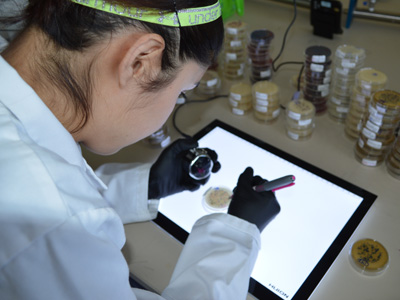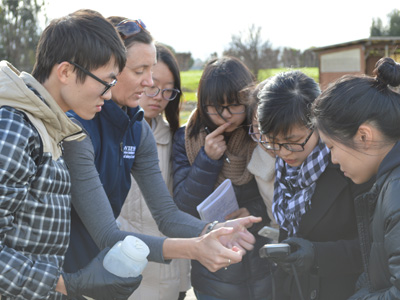WIFSS News Roundup
January 4, 2017
 Research
Research
Cutting edge research discoveries and innovative training programs at WIFSS are impacting local, national, and global food safety issues. Our comprehensive programs address food and water safety as well as the security of the food supply and sustainability of rural communities during natural and terrorist threats.
We are identifying the factors that drive the distribution patterns of microbial pathogens causing water- and foodborne diseases in humans. Our research activities address existing and emerging issues related to produce, animals and their related commodity products contaminated by pathogens that cause disease in people.
WIFSS researchers examine the complex relationships that exist between people, animals, and the environment in order to better understand how interactions of these factors might result in disease.
112th annual meeting of the Washington State Tree Fruit Association: Melissa Partyka, a staff research associate with the Atwill Water and Foodborne Zoonotic Disease Laboratory with WIFSS, at the UC Davis School of Veterinary Medicine, shared some tips for getting started and taking water samples that will be required for monitoring for potential microbial contaminants during the 112th annual meeting of the Washington State Tree Fruit Association held in Wenatchee, WA.
Agriculture Water Quality Important Component in Food Safety: The FDA Food Safety Modernization Act (FSMA) Produce Safety Rule is now final and it marks a change in the way we regulate food safety. What does this mean for growers as they learn to comply to the new standards?
Water sampling done simply: Water Sampling Done Simply offers easy to follow recommendations for water quality sampling under the FSMA Produce Safety Rule for Agricultural Water testing.
Researchers educating growers about proper water sampling: UC Davis researchers give water quality workshops helping train growers about proper methods for obtaining accurate water samples in order to be in compliance with the new food safety regulations in the Produce Safety Rules for the Food Safety Modernization Act (FSMA).
Healthy harvest: Researchers explore impact of raw manure on tomatoes: A group of researchers from UC Davis, the USDA Agricultural Research Service and the FDA’s Center for Food Safety and Applied Nutrition are undertaking research to strengthen scientific support for any future proposal regarding the appropriate time interval(s) between application of biological soil amendments and harvest.
A veterinarian’s perspective: FDA’s milk residue study and our food safety: The new FDA report on drug residues in milk concludes that milk is safe, but if they found any drugs at all, how safe can it really be?
Keep safe while clamming in Northern California: UC Davis researchers are interested in studying communities of bacteria associated with the clams on tidal flats in Northern California. They are focusing on vibrios, a type of bacteria which have caused a growing number of illnesses over the last 10 years, particularly from consumption of undercooked seafood.
 Training
Training
WIFSS is committed to teaching people about food safety from the soil to the table. We educate about the link between people, animals, and the environment. This is the philosophy of One Health. Our curriculum empowers individuals and teams with the knowledge to take action.
We address food safety issues by teaching people about awareness, preparedness, response, recovery, and prevention. A safe global food chain is the result of solving the food safety and security concerns and building strong preventive food safety systems both here at home, and in countries throughout the world.
Food Safety Conference Achieves a Virtuous Cycle: Animal science and veterinary faculty from six provincial vocational colleges in China attended the One Health for Food Safety Conference for Animal and Veterinary Scientists held at UC Davis designed to increase the awareness of a comprehensive One Health approach to food safety through education, management, and application of technical services.
Collaboration Central to Food Safety in Organic Agriculture: The School of Veterinary Medicine and its partners recently held a workshop featuring in-depth discussions, surveys and listening sessions on issues important to organic farmers. Topics included the use of raw manure and compost, rotational grazing practices and extension needs including technology innovations and other tools to help them comply with new food safety regulations.
Team Work Helps Solve Food Safety Problems: Excessive pesticide residues in the environment entering the human food chain are a potential health risk. This was one of the food safety problems which students chose to address during the 3-week NAU-UC Davis Graduate Education Conference on One Health.
Rural Training Courses Help Protect Our Food Supply: More than 25 first responders were present for the one-day combined AWR 151 and 154 crash course in Fellsmere, FL, conducting tabletop exercises to protect our food supply.
Building FSMA Training Curriculum: WIFSS team members take part in the ongoing effort in the development of curriculum that will train food protection professionals to meet the requirements of the Food Safety Modernization Act (FSMA).
Preparation and planning essential to successful disaster response teams: First responders attending the pilot courses for DHS AWR 328 and MGT 448, shared their experience with disaster planning and preparedness as they took part in hands-on, problem-solving activities in the courses which took place at the California Fire & Rescue Training Authority.
WIFSS Training Rural Area First Responders: A full day of intensive training outlining the potential effects of possible types of agroterrorism, and the impact of an incident on the entire food system or on a specific segment of the food system, included a case scenario of an intentional tampering of a water supply for a produce crop.
New series of “Do you know” videos on the way: The DeLaval “Do You Know” video series aid viewers in identifying milk fever and calf scours, and understanding the proper maintenance of dairy equipment.
Breaking the chain of foodborne illnesses through education: WIFSS is improving food safety from soil to table through its One Health for Food Safety conferences by the threefold mission of raising awareness, encouraging team building, and bringing about change through calls to action.
Farm-to-Fork Festival: The fourth annual Farm-to-Fork Festival held on Capitol Mall in Sacramento included the popular School of Veterinary Medicine – WIFSS booth which features family-friendly games focused on testing festival goer’s food safety knowledge.
FMD Dairy Field Day: An FMD Dairy Field Day held in Tulare, CA, helped raise awareness of actions that producers and processors can take for continuity of business before and during a Foot and Mouth Disease outbreak.
Joint Education Program Expands Graduate Student and Faculty Exchanges: The NAU – UC Davis One Health for Food Safety and Animal Health Symposium encouraged open dialogue and developed action items for curricular development and graduate research programs.
Workshop supports protection of our food supply: A FARAD workshop helped launch future working relationships between the School of Veterinary Medicine, WIFSS, and NAU, to increase educational and research collaborations related to One Health in food safety and food supply drug residue avoidance.
Training courses phased out to make room for new instruction: First responders from across the state of California from San Diego to Sutter counties attended training for organizing the recovery from an incident of agroterrorism or food systems disaster.
